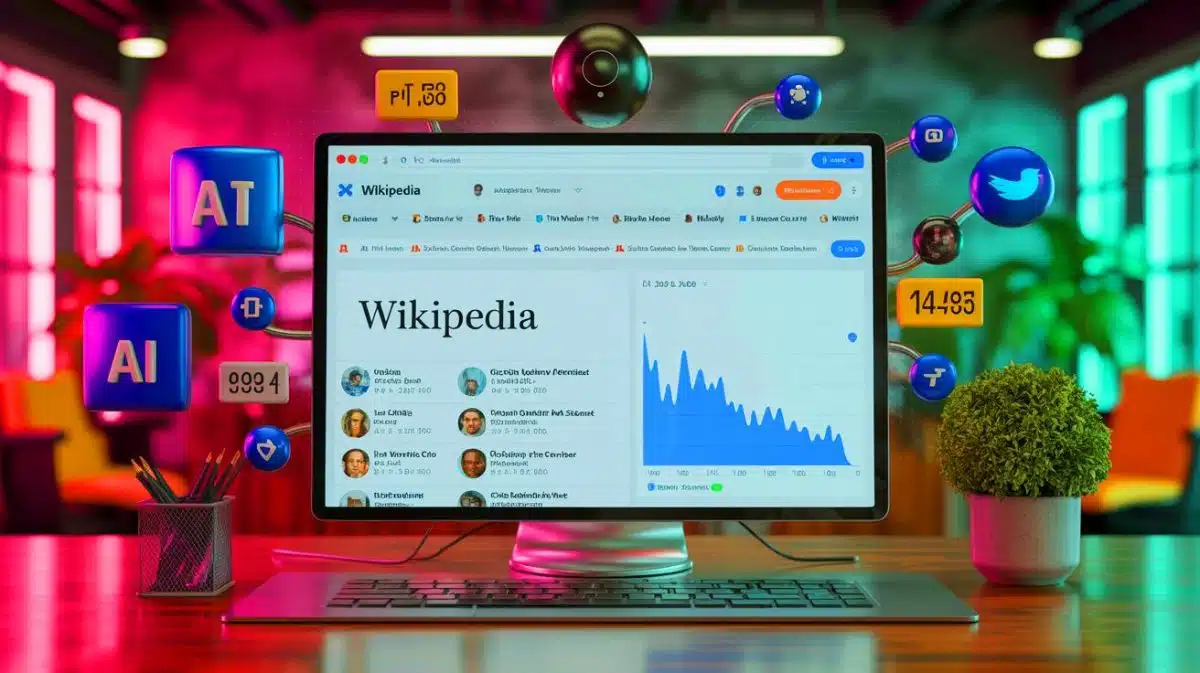For years, Wikipedia was the go-to place for people who wanted to learn something quickly and trust what they found. Now, it seems even Wikipedia is feeling the effects of major changes online.
The site’s traffic has dropped, and there are two big reasons given: AI search summaries and social video.
What is happening
Wikipedia’s parent group, the Wikimedia Foundation, recently reported that they saw an 8 % drop in human pageviews year-over-year. That means fewer people are visiting Wikipedia to read its articles.
On top of that, they found that some of the traffic they thought was from people was actually from bots.
The Foundation updated its system that detects bots and realized that “unusually high” traffic in May and June was coming from bots that were built to act like real users.
Why traffic is going down
According to Wikipedia, the drop in traffic is not because people no longer trust the site. Instead, it is because the way people get information is changing. Two big changes are important:
- AI Search Summaries
Search engines and other websites are increasingly using generative AI to give direct answers to users. Instead of clicking on a link and going to a website like Wikipedia, users might get the answer right in their search result. This means fewer visits to the website itself. Wikipedia says this shift is hurting its traffic. - Social Video Platforms
Younger people in particular are now turning to social video platforms (such as short-form videos) instead of reading text on websites. They look for quick answers in video form, not long articles. Wikipedia notes that these changes in how people learn and search are affecting it.
Why this matters
When fewer people visit Wikipedia, it creates a number of problems:
- Fewer readers means fewer volunteers editing and improving articles. Wikipedia relies on a community of volunteers.
- Less traffic can mean fewer donations. Wikipedia asks for support from readers and depends on funding.
- If the site is used less, people may forget to check where their information comes from. The risk is that information could be filtered by AI or social platforms without clear sources.
- When information comes through AI summaries or social videos, you might get the gist of a topic without visiting the original article or verifying the claims. Wikipedia warns that citing sources and checking original material is important.
How Wikipedia is responding
Wikipedia is not just watching the decline happen. The foundation is taking action to adapt:
- It is building a new framework to better attribute its content when others use it. That means if AI or other platforms use Wikipedia information, they should link back or give proper credit.
- It has two dedicated teams working to reach new readers and keep current readers engaged.
- It is actively looking for more volunteers and donors to support its service and maintain the quality of its content.
- The foundation is asking users to “look for citations and click through to the original source material.” It wants people to have awareness of where their knowledge comes from.
The bigger picture
This story is more than just about Wikipedia. It reflects how the internet and information gathering are changing. AI search summaries and social video platforms are reshaping the way we learn, communicate and share knowledge. If we are not careful, this could mean we lose track of how information is created, verified, and updated.
There is also a risk that the “open web” fades as a place of detailed articles and thoughtful research. If more people rely purely on AI answers or quick video clips, sites like Wikipedia may be forgotten. The open web is built on trust, transparency and human effort. That could weaken if even Wikipedia sees lower engagement.
What you can do as a reader
- When you use search engines and see an answer right away, consider clicking through to the source to check the full context and details.
- On social video platforms, remember that quick clips may give you a summary but often lack depth and sourcing.
- If you benefit from sites like Wikipedia, consider supporting them through donations or by contributing if you can.
- Think about where your knowledge comes from. Are you just reading an AI summary or watching a quick video? Or are you visiting an article with references, detail and human oversight?
- Encourage others to check sources, click through, and value human-curated knowledge.
The Bottom Line
Wikipedia’s drop in traffic is a powerful signal. It shows how much the internet is changing. The shift toward AI-driven search and social video is real, and it is affecting even the most trusted knowledge sites.
While change can bring new opportunities, it is important that we don’t lose sight of the value of human-created, curated information. That kind of knowledge matters in a world where misinformation, shortcuts and superficial content are everywhere.
Also Read:New Pinterest Settings Let You Reduce How Much AI Slop You See on Your Feed

